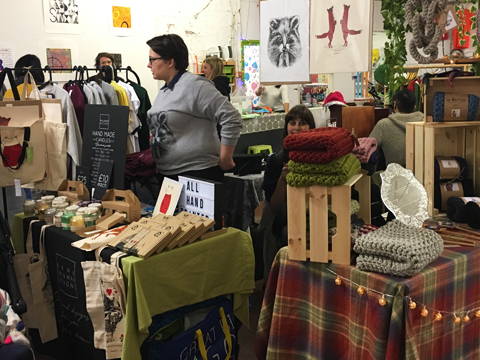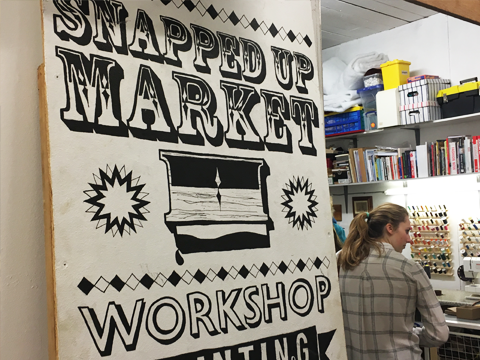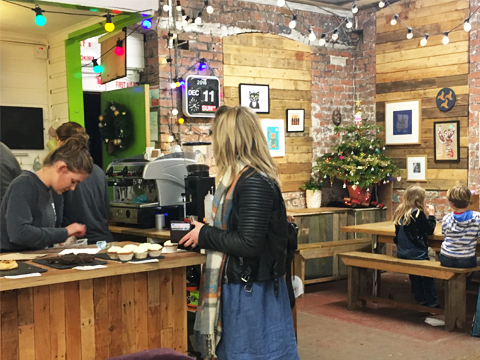Pop-ups are changing the city’s shopping scene, but where are these hidden gems?
Throughout this year, it seems as though pop-up shops have been multiplying all over Cardiff. These shops, cafés and restaurants often provide unique foods and wares for a limited time, making them the go-to places for shoppers with an eye for the unique – and now there’s more choice than ever for consumers in the know.
However, usually hidden in alleys, behind buildings or in quiet areas of town, these offerings often go unnoticed by the typical high street shopper, meaning many pop-ups have to fight for survival if they want to become a permanent business.
Success stories
Cardiff is home to a higher number of success stories than the average city with many pop-ups making the leap to permanent this year. At the city’s heart is a thriving community of creatives and dreamers, and a wide variety of available spaces for those willing to risk it for the chance of having their own business – and it certainly seems to pay off.
One such success is Dusty Knuckle Pizza. Started by Phil Lewis and partner 2 years ago, the business proved so popular they’ve now moved to a more permanent home in Printhaus, a collection of creative studios located off Llandaff Road in Canton, which only this weekend held a successful pop-up Christmas Market titled Snapped-Up.
While Dusty Knuckle do still operate as a pop-up, Phil, 38 from Cardiff, said the decision to set up a shop at Printhaus was mainly financial, but the small business owner quickly learned that the move wasn’t as simple as it seemed.
“When we were a pop-up it was all about our food, but when we opened up the permanent place it became more about the experience,” said the 38-year-old. “That was quite a steep learning curve for us.”
However, Dusty Knuckle has made it work using some clever social media tactics and a loyal client base, and they now regularly sell out of pizzas.
Hidden gems
Some part of this success may be down to the business’ location in Canton, which seems like the perfect hub for pop-up entrepreneurs. Just around the corner from Printhaus is the popular Bone Yard, started by Jodie Davies, 36, from Kent, and her partner just over a year ago.
Home to many hidden gems in the city, The Bone Yard is tucked away behind a typical shop front and comprises of several shipping crates filled with a variety of small businesses and pop-ups.
On the benefits of pop-up culture, Jodie says:
“It allows people to try out their creative ideas without the pressure of having to take on a space – that’s what’s exciting. They’re different, they’re fresh, and it gives people a real opportunity to experiment.”
While it seems that many more temporary businesses are setting down permanent roots, the idea of a successful pop-up isn’t exactly a new one.
Many big name brands started out in trucks and pop-ups before making it big – Innocent smoothies, for example, started out selling at festivals from a custom-made van. The owners polled a festival audience as to whether they should quit their jobs and pursue their business full time, and the answer was a resounding ‘yes’.
A growing market
It is undoubtedly down to some of these successes that pop-up culture is becoming so huge worldwide, and especially in Cardiff. According to telecoms company EE’s annual pop-up retail report, temporary retailers made over £2.3 billion in income in 2015. This growth of 12.2% on the previous year lies in stark contrast with the much smaller increase of 1.1% for total UK high street sales, proving that this new way to shop is definitely on the rise.
However, while the pop-up industry is having its moment in Cardiff, as EE’s report particularly highlights, it may be having a negative impact on the wider world of retail. According to the British Retail Consortium (BRC), short-term tenancies are causing issues to the overall economic growth of the UK. In a report published in November, the consortium says: “There is some suggestion that landlords are welcoming retail tenants on shorter leases.
“While this could be good in the short term for retailers needing more flexible arrangements, it also bears witness to a lack of long-term stability in many areas.”
The figures show that footfall on the UK high street has been dropping steadily over the past few months and October’s foot traffic was down 0.4% on last year’s. But is this pop-ups’ fault?
Tom Whitehead, a partner at Printhaus from Cardiff, believes that there is a lack of exposure for small businesses such as his, in contrast to EE’s figures. He says: “We have had a struggle; people two streets away say ‘We didn’t know you were here’. We have been flyering door-to-door constantly.”
It has to be said, though, that with the right business model, pop-ups may present a bright future for Cardiff’s shopping culture. Dusty Knuckle owner Phil credits a lot of their success to the passion and uniqueness that exists within the pop-up community.
He says: “Every year you see a number of pop-ups who come [wanting to make money] and then they disappear again… If you’re thinking like that, it’s not gonna happen – it’s the wrong reason. Don’t do it for the money, do it because you love it.”
—–
Liked this? Take a look at our articles on Got Beef pop-up, Outpost, Cardiff street food, and Indie Arcade shops




